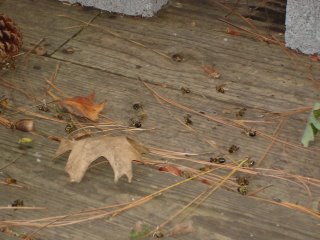
In front of Bermuda, there were scores of dead bees and yellow jackets today. I have recently seen the yellow jackets congregating outside the front of the hive about a foot from the porch. I guess robbing happened and bees and yellow jackets died.
When I inspected the hives today, I put the entrance reducer on both hives. If the yellow jackets continue their assault, I'll put the robber screen back on the hives.



Beekeeping (or apiculture) is the maintenance of bee colonies, commonly in man-made hives, by humans. Most such bees are honey bee farming in the genus Apis, but other honey-producing bees such as Melipona stingless bees are also kept.
ReplyDelete